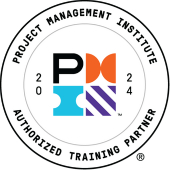Certified Associate in Project Management (CAPM)® Exam Bootcamp Training V7.0 – (3 days, 23 PDUs)
Learning Objectives
- Boost your project management knowledge.
- Develop the crucial project management skills needed to deliver on time and on budget.
- Understand practical applications in the workplace.
- Satisfy the 23-hour study requirement needed to qualify for the CAPM exam
Introduction
The Certified Associate in Project Management (CAPM)®is for individuals seeking to gain more responsibility or addproject management skills to their current role. The CAPM® certification offers recognition to practitioners who are interested in, or just starting, a career in project management, as well as project team members who wish to demonstrate their project management knowledge. This certification indicates knowledge of common practices used by an associate-level project manager as outlined in the CAPM Examination Content Outline(ECO). PMI aligns its process with certification industry best practices, such as those found within A Guide to the Project Management Body of Knowledge (PMBOK®Guide) – Seventh Edition.
Individuals who contribute specialized skills to a project team can benefit from this certification by aligning their work with project managers. Individuals who do not have project experience but are interested in project management can also benefit from this certification by demonstrating their professional knowledge. This knowledge can be applied to on-the-job experiences that help develop competencies in the practice of project management. Individuals who carry the CAPM designation after their name enjoya highl evel of credibility from Project Management Professional (PMP)® certification holders, project managers, employers, and peers.
The CAPM examination accurately reflects the practices of project team members. All the questions on the examination have been written and extensively reviewed by subject matter experts and can be found in a minimum of two references. These questions are mapped to the CAPMECO to ensure that an appropriate number of questions are in place for valid examination. These references are: PMBOK® Guide – Seventh Edition, Process Groups: A Practice Guide (2022), The PMI Guide to Business Analysis (2017), Business Analysis for Practitioners: APractice Guide (2015), Agile Practice Guide(2017) The Project Management Answer Book (Second Edition), and Effective Project Management: Traditional, Agile, Extreme, Hybrid(8thEdition). Reading each book on the reference list is not a requirement, but candidates may find it helpful to review them. This reference list is provided as a courtesy only and for the non-PMI publications on the list, PMI does not endorse such publication or warrant the accuracy of the information or opinions contained therein.
Course Overview and Agenda
The following table identifies the proportion of questions from each domain that will appear on the examination.
| Domain | Percentage of Items on Test |
| I. Project Management Fundamentals and Core Concepts | 36% |
| II. Predictive, Plan-Based Methodologies | 17% |
| III. Agile Frameworks/Methodologies | 20% |
| IV. Business Analysis Frameworks | 27% |
| Total | 100% |
Important note: The research conducted through the Job Task Analysis(JTA) validated that today’s project team members work in a variety of project environments and utilize different project approaches. Accordingly, the CAPM certification will be reflective of this and will incorporate approaches across the value-delivery spectrum. The examination will test the skills that entry-and associate-level individuals need in order to understand project management fundamentals as well as predictive, adaptive, and business analysis principles. These approaches will be found throughout the four domain areas listed above and are not isolated to any particular domain or task. The exact number of items for each question type and approach may vary by form. The scoring model is periodically reviewed by scoring experts to ensure valid assessment of knowledge and skills.
Course Agenda
- Module 1: Course Overview. Get a concise overview of the CAPM preparation course and broaden your understanding of project management fundamentals.
- Module 2: Projects and Project Management. Learn the fundamental principles of project management, its structure, and critical significance of executing projects.
- Module 3: Organizing for Project Performance. Learn about project performance by exploring project team roles, stakeholder engagement, and ethics in project management.
- Module 4: Business Analysis Framework. Gain a comprehensive understanding of the business analyst’s role, the intricacies of requirement gathering, and the dynamics of stakeholder collaboration within the business analysis framework.
- Module 5: Business Analysis Domains. Learn about business analysis processes and requirements through various models and approaches.
- Module 6: Life Cycles, Development Approaches, and Common Elements. Delve into the intricacies of project and product life cycles, explore various development approaches, and master key project performance areas such as scope, scheduling, and risk management.
- Module 7: Predictive Methodologies. Learn how to select and apply predictive methodologies for strategic project planning and execution, encompassing team development and risk identification.
- Module 8: Project Work and Delivery. Gain insight into predictive methodology principles and enhance your ability to manage project communications, risks, quality, and stakeholder interaction effectively.
- Module 9: Adaptive Approaches. Discover how to strategically manage projects and teams using adaptive methodologies to effect delivery in adaptive project environments.
- Module 10: Measurement Tracking and Managing Uncertainty. Deepen your understanding of measurement tracking and uncertainty management to pinpoint challenges, assess adaptive project performance, and proactively mitigate risks.
Certification
Participants will receive a certificate of completion and be eligible to claim:
- Project Management Institute: 23 Ways of Working
- Scrum Alliance: 21 SEUs.


